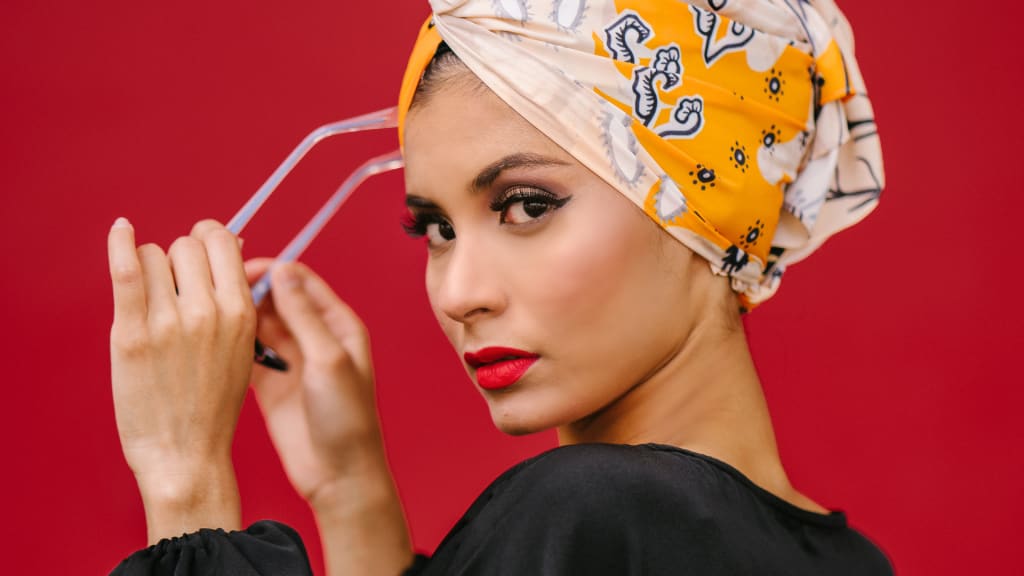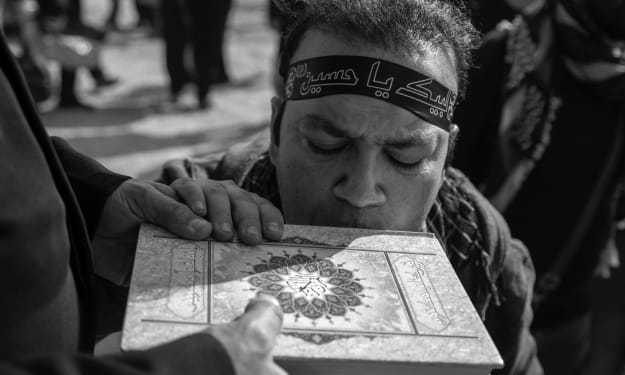The Muslim Hair-Cutting Experience
It can get complicated.

I'm sitting in a salon chair with foil layered between sections of my brown hair. With some of my surplus derived from my larger-than-normal paycheck, I decided to get blonde highlights. You know, 'treat yourself' stuff.
Throughout the two hours, men and women walk in and out of the salon, ranging from children to elderly people. Some have silky, long flowing hair, while others have tight curls that hug their neck. A year ago I would've been able to just sit there and enjoy the time unplugged from my phone, people watching. I probably would've tried to avoid talking to my hairdresser as best I could, to protect myself from any awkward silences between conversation fragments.
But now it's different. I'm different. I'm a Religious Studies major who has read hundreds of research pages on the spiritual intersections of the body and sexuality -—especially in faiths such as Islam or even Orthodox Judaism. I can't stop thinking about these client's hair.
My question: How does the experience of cutting one's hair differ for men and women practicing Islam in the United States?
The Pew Research center reported in 2011 that about 1 million Muslim women lived in the United States of America. Of this group, only about 43 percent wore headscarves all the time, and 48 percent never did (stats that surprised me in and of themselves).
If you're part of those 43,000 women who cuts your hair? Surely a woman cuts a woman's hair — that's a given. But in the wide-open, with male hairdressers as well? The US Department of Labor (2016) estimates that 7.6 percent of all hairdressers are male. That's 5/38. Though 7.6 percent sounds insignificant, if one makes such a dramatic effort to veil their hair in their daily life, that becomes pretty significant. While we're at it — what about the fairly characteristic glass door and facade that reveals oneself to those walking by? That also sounds quite problematic.
I decided to ask these questions to three of my good Muslim friends, including two women who wear a hijab daily and one who doesn't.
"Hijabis I know get their hair cut by friends, family, or in private salons."
"As a hijabi, I ask to be taken to a private area or room in the salon if I need to get my hair done."
"I went to a place that was known for accommodating hijabi women —I booked a private room a month in advance, and called the day before to remind them."
In all three cases, each cited the use of a private area or room in a private salon, something I've never even considered or thought about.
In the third of these cases, the story took a dark turn.
The woman I was interviewing, walked me through the experience of booking her room, but arriving and finding they weren't able to cut her hair in this private area due to the A/C cutting out.
"I was told, "oh it's just one man working back there, it's just one man that would see." I was like "… . no that's not an option."
Very hesitantly, my friend agreed to get her hair cut in the main room, so long as the man stood in another room during her cut. Even then, the fear of a man walking by the glass door (or worse as a walk-in) consumed her head. Then it got worse.
"Unfortunately a man came right up to that door and looked right in and at me. I was so upset and uncomfortable… I put my hijab back on, I was crying heavily, and I went up to [my hairdresser] and told her that what was happening was not okay; it was disrespectful and that this was very serious to me—not a joke. The decision I made was for God, and it just felt like that was being violated and not taken seriously."
The hairdresser "acted upset," but clearly felt her client was over-reacting. After all, it's just hair, right?
She did not receive financial compensation, even though her treatment wasn't complete.
I'm going to go out on a limb, and guess there aren't a whole lot of veiled women (both hailing from Islam but also some streams of Judaism and Christianity) who care about dying their hair red or getting highlights like I was, but that doesn't mean they don't need to get it cut. In each of these examples, these women clearly needed their hair cut. Being a woman doesn't mean you don't get split ends, or your hair doesn't get too long. Besides, I'm sure the euphoria of a super clean scalp isn't limited to those who expose their hair.
These questions are not just limited to women; what about men? Is it appropriate for a woman who is not 'properly covered' to cut a man's hair? What about washing the hair? The head massage - scrubbing in of shampoo and perhaps conditioner? Or does the simple fact that the location is a hair salon not change the day-to-day reality of living in the United States, where an overwhelming majority of women do not veil themselves?
I remember visiting an Orthodox Jew couple once who refused to touch members of the other sex, even if it were just a handshake (I embarrassingly learned this the hard way). The wife wore a wig as a veil, for modesty reasons. Reflecting back on this, it makes me wonder, does touching hair count as touch? There's no denying that the experience of cutting another's hair is quite intimate, but this isn't quite the stuff written about in the Quran.
When asked about these issues as it relates to men, the consistency dissipated. Many points got brought up, primarily related to cultural relativism, or simply the idea that a person's beliefs, values, and practices should be understood based on that person's own culture, rather than be judged against the criteria of another, as it was defined by Franz Boas.
"You bring up a great point about the intimacy of getting your scalp massaged, and it would probably pose a problem for Muslims if they were to be assigned a hairdresser of the opposite sex."
"I actually never considered the issue for males, but I guess it depends on personal preference."
"My mom cuts my dad's hair, but he once had it cut by a woman and it was fine. It's also different cuz American culture is so different from Islamic culture. Like even Muslim Americans who see my hair aren't dazed by it, even if I wore shorts. But in Saudi Arabia?"
"I would say it's inappropriate, AND it's something we have to accept. There's pork, alcohol, nudity, just so much sin everywhere, and we deal with it. But like again, Muslim men here are desensitized to half naked women, so I think she would have to be dressed really bad to impact them."
"From my experience, Iranian men who immigrate here are super careful about keeping their distance from women. So I'm sure they would never have a woman cut their hair."
When it came to women, the answers were more clear-cut. There was a shared understanding of how to confront the issues related to gender, identity, faith, and hair. When it came to men, the answers were more abstract and open to the culture in which a man lives.
Either way, this issue does not only affect one party. Both men and women are impacted by the conundrum of being both Muslim and needing to get a simple trim or their scalp deep cleaned. Both must bridge the gap between two cultures, including moving a culture that differs from you inward (the United States culture surrounding feminine hair toward the traditional Islamic culture surrounding female hair), and an inward culture toward an outward one (the Islamic desire for modesty toward a culture that does not value modesty in the same way).
In what ways do we preform these compromises personally? Morally? Spiritually?
I'll conclude with some thought-provoking notions from one of my brilliant friends, and interviewees:
"[U]ltimately it's all up to the individual and what their intention is. This is something I wrestle with [though]: do we continue to make compromises like this, or is it incumbent on us to live in a Muslim society?… I guess it kinda shows how a simple thing like a haircut can be an issue or challenge for some people"
About the Creator
Allison van Tilborgh
Scholar of Communication and Religion. Editor of Interfaith Now on Medium. Amateur conversationalist.






Comments
There are no comments for this story
Be the first to respond and start the conversation.